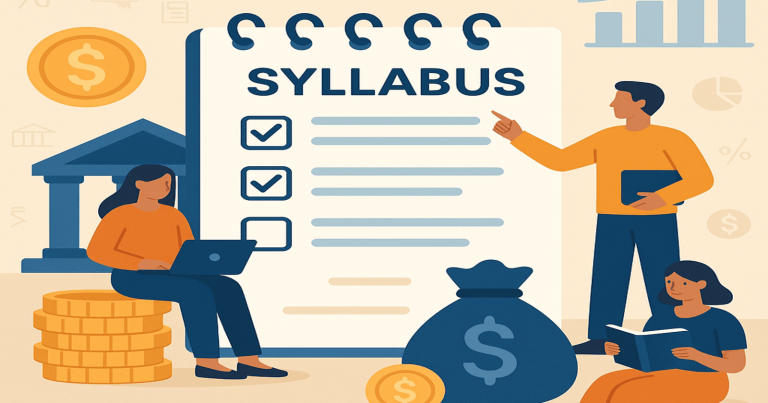If you want to make a career in banks or financial companies, you must learn the right subjects. The banking and finance course syllabus teaches you all the skills you need. These include money handling, customer dealing, loans, investments, and computer tools used in banks. This course suits students who have finished class 12 or graduation. Many colleges and institutes offer it. Most jobs in banks and finance firms ask for these subjects.
The syllabus helps you learn finance rules, savings methods, accounting steps, and laws that guide the banking world. You also get better at communication, data handling, and maths. This course builds your base to apply for jobs like bank clerk, PO, financial advisor, loan officer, or credit manager.
Banking and Finance Course
The Banking and Finance course helps you learn everything about banks, money systems, and finance. You understand how banks work, how people borrow and save, and how companies handle their money.
Many universities in India offer diploma, undergraduate, and postgraduate courses in banking and finance. Some popular ones include B.Com in Banking and Finance, MBA in Finance, Diploma in Banking Services, and PG Diploma in Banking and Financial Services. Private institutes and government colleges both provide this course.
Types of Banking and Finance Courses in India
These courses come in many levels. Based on your qualification, you can pick the right one:
| Course Name | Duration | Eligibility |
| Certificate in Banking | 3–6 months | 12th Pass |
| Diploma in Banking & Finance | 1 year | 12th or Graduation |
| B.Com in Banking & Finance | 3 years | 12th Pass |
| MBA in Banking & Finance | 2 years | Graduation |
| PG Diploma in Finance | 1 year | Graduation |
Each course has a syllabus based on your level. Undergraduate courses teach you the basics. Postgraduate ones go deeper into complex finance systems.
Core Subjects in Banking and Finance Course Syllabus
The syllabus covers many core subjects. These are important in every course type, whether diploma, B.Com, or MBA.
These subjects help you understand how banking and finance systems work. These build the base for further studies and jobs in finance.
Key Topics in the Core Syllabus
- Principles of Banking – This covers the role and types of banks, functions, and systems.
- Business Mathematics – You learn simple interest, compound interest, ratios, and percentages.
- Financial Accounting – It teaches journal entries, ledgers, trial balance, and final accounts.
- Banking Regulations – This includes RBI rules, KYC, and Anti-Money Laundering acts.
- Indian Financial System – You study stock markets, mutual funds, NBFCs, and regulators.
- Microeconomics – Basic demand, supply, inflation, and pricing rules.
These subjects form the base of your banking knowledge. If you master them, you can solve real problems in jobs. Most government bank exams also include these subjects.
Advanced Subjects in Banking and Finance Course Syllabus
After core subjects, the advanced syllabus trains you in deep and specific areas of finance. These are common in postgraduate and PG diploma courses.
Advanced subjects help you deal with real-world finance cases. These also help when you apply for senior-level jobs.
Important Advanced Syllabus Topics
- Corporate Finance – Managing company funds, capital structures, and financial planning.
- Risk Management – Handling credit risk, market risk, operational risk.
- International Banking – Foreign exchange, global trade, currency rules.
- Investment Banking – Mergers, acquisitions, underwriting, and IPOs.
- Derivatives and Futures – Trading options, swaps, and forwards.
- Fintech and Digital Banking – Blockchain, UPI, online loans, and security.
These topics need more practice and updated reading. Many private jobs in MNCs and fintech firms prefer candidates with this knowledge. If you study well, you get a good package and top roles.
Practical Training and Soft Skills Subjects
Banking jobs need both theory and practical knowledge. That’s why the course also includes soft skills and real training.
These subjects help you talk to customers, use banking software, and do internships.
Key Practical and Soft Skill Subjects
- Computer Applications in Banking – Core banking system (CBS), Excel, accounting software.
- Customer Relationship Management (CRM) – Handling clients, dealing with queries, keeping records.
- Internship or Industry Visit – Learning from real bank branches or finance firms.
- Communication Skills – Writing mails, talking to clients, giving reports.
- Ethics and Corporate Governance – Doing business with honesty, following rules.
Many banks look for candidates who can handle customers and tech tools. These subjects help you gain that edge.
Banking and Finance Syllabus for Job-Oriented Courses
Many short courses focus only on job training. These are fast and useful if you want to prepare for a job quickly.
These job-oriented courses teach exam-focused content. You also learn tools like tally, banking software, and customer dealing.
Job-Oriented Course Topics
- Basics of Banking & Financial Services
- Retail Banking and Loan Processing
- Tally, GST, and Excel
- Resume Writing and Interview Practice
- Financial Products and Wealth Management
These help students who want quick jobs after 12th or graduation. Many skill development programs by NSDC also include this syllabus.
Banking and Finance Course Syllabus FAQs
Q1. What is the banking and finance course syllabus?
The banking and finance course syllabus includes topics like banking principles, accounting, financial laws, risk management, and fintech.
Q2. Which subjects are taught in B.Com Banking and Finance?
Subjects include Banking Basics, Financial Accounting, Risk Management, and Corporate Laws.
Q3. What are the job-oriented banking courses?
They include training in loan handling, GST, tally, digital banking, and customer service.
Q4. Are banking and finance courses good after 12th?
Yes, it builds a strong base for bank exams and private finance jobs.
Q5. Do banks value these course certifications?
Yes, public and private banks both value banking course certifications and diplomas.


